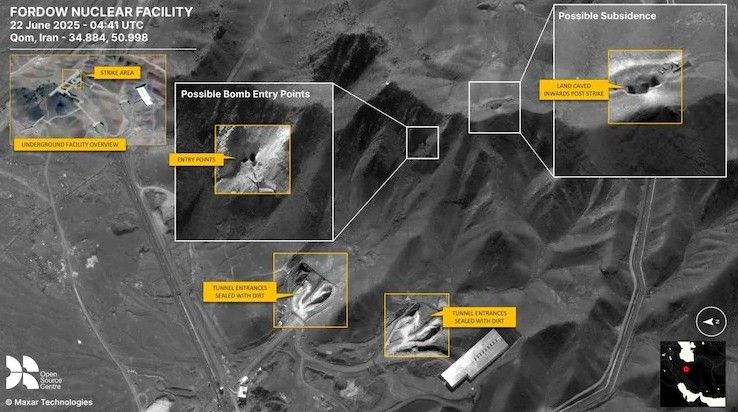A senior Israeli official has warned that Iran might still be able to access enriched uranium stored at its Isfahan nuclear facility, despite last month’s U.S. airstrikes that targeted three Iranian nuclear sites.
The official, who spoke anonymously, noted that although retrieving the buried material would be challenging, any attempt by Iran to do so would be detected and met with renewed airstrikes.
The disclosure contradicts U.S. President Donald Trump’s assertion that Operation Midnight Hammer resulted in the “total obliteration” of Iran’s nuclear facilities. White House spokeswoman Anna Kelly supported this claim, stating that the world is “safer thanks to his decisive leadership.” However, Rafael Grossi, the chief of the International Atomic Energy Agency (IAEA), provided a more balanced evaluation. He confirmed that while there was significant damage, some structures remain intact.
The enriched uranium at Isfahan could potentially be retrieved by Iranians but reaching it would take a very difficult recovery effort, the Israeli official saidhttps://t.co/dcXEcayXpu
— The New Arab (@The_NewArab) July 11, 2025Iran maintains its nuclear program serves peaceful purposes, with Foreign Minister Abbas Araghchi calling uranium enrichment “a question of national pride and dignity.” Newly elected President Mahmoud Pezeshkian acknowledged severe damage to facilities during an interview with Tucker Carlson, stating full assessment remains impossible.
The enriched uranium at Isfahan could potentially be retrieved by Iranians, but reaching it would take a very difficult recovery effort, the Israeli official said. https://t.co/4XXY3kmRnS
— News4JAX (@wjxt4) July 11, 2025Israeli intelligence estimates the strikes set back Iran’s nuclear program by two years, though the buried uranium at Isfahan reportedly constitutes most of Iran’s enriched stockpile. The situation highlights ongoing tensions in the region, with verification of the sites’ status remaining contested among world powers.






